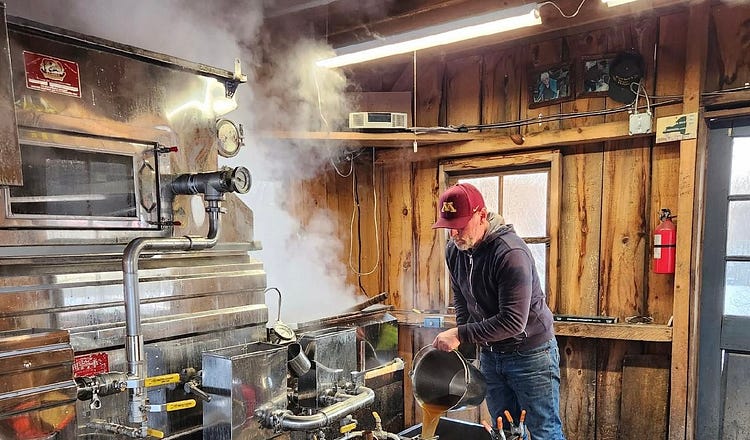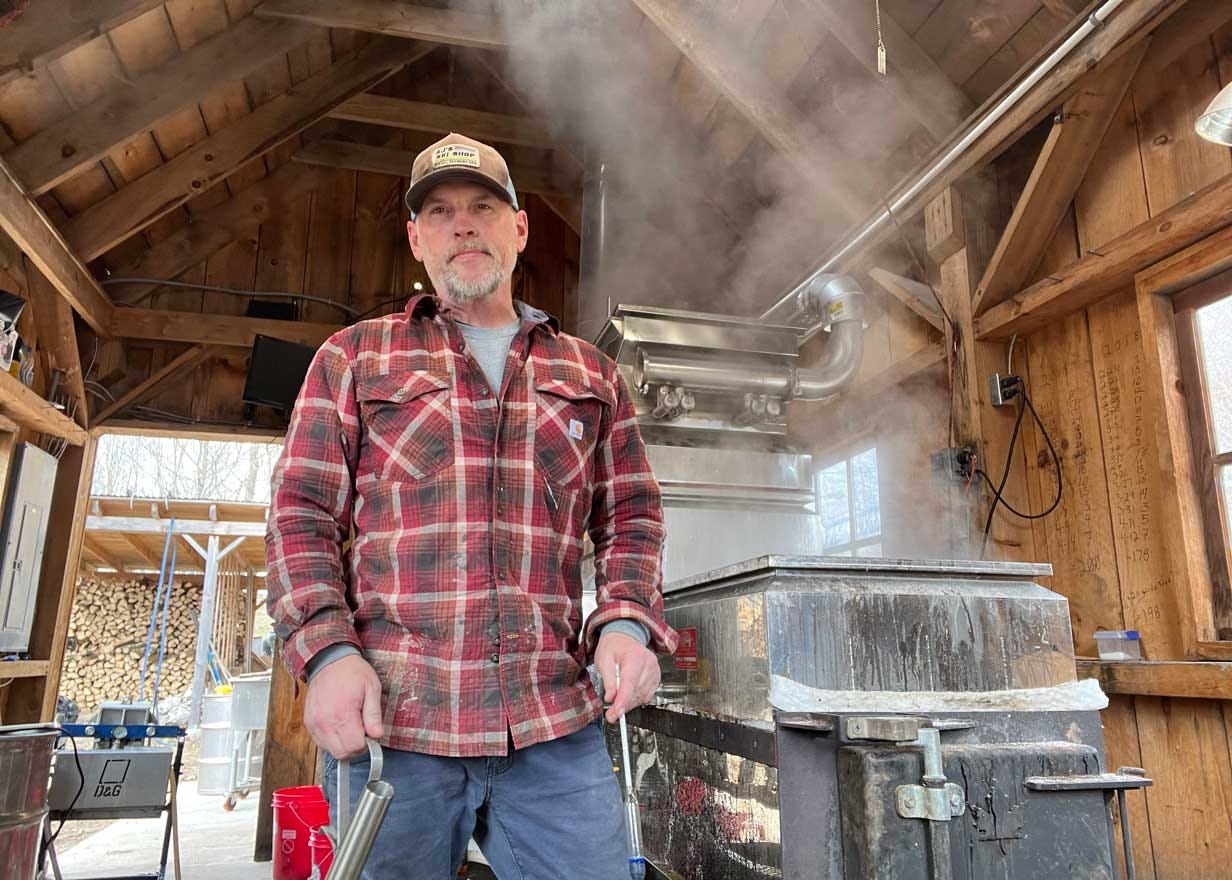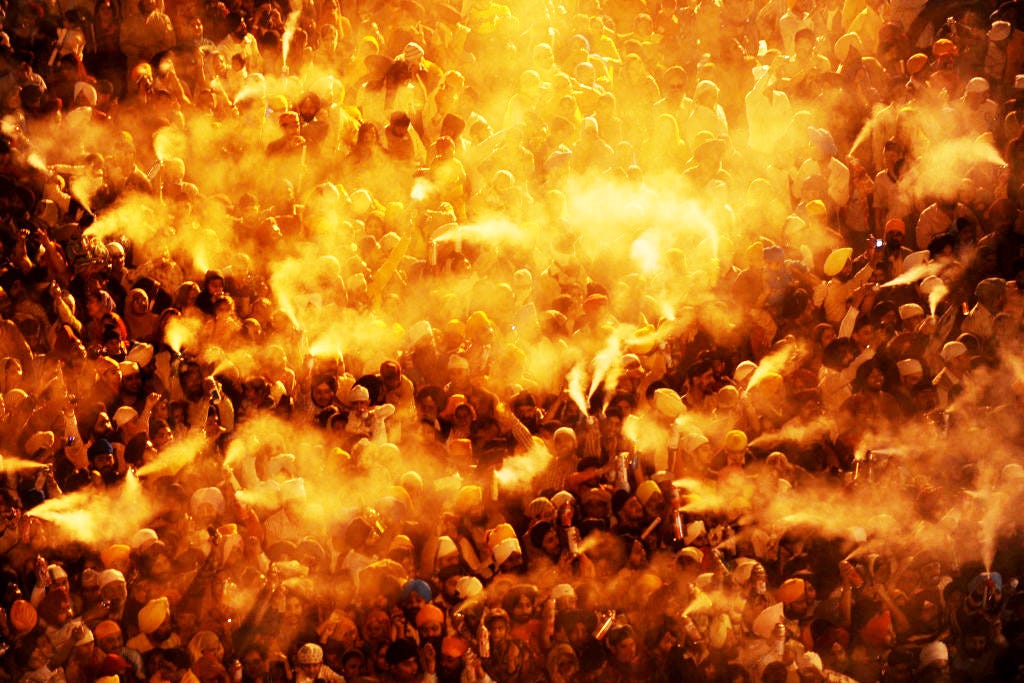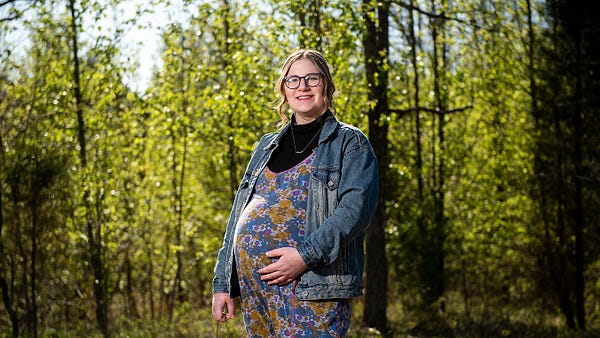
The Free Press

Within every American is the impulse to make a run for it—out of town, into the woods. But if you think it’s easy to build a life for yourself out there, it’s worth reading the tale of Peter Gregg, who lives deep in the forests that span the border between New York and Vermont, where he runs a farm that produces something as mercurial as it is American: maple syrup.
Below is our exclusive excerpt of Peter’s memoir—The Sugar Rush, released earlier this month—which follows his madcap adventure into the world of what the pros call “sugaring.” What starts as a hobby quickly becomes an obsession, and Peter contends with treacherous conditions, ballooning costs, unfriendly wildlife, and other perils.
Along the way, he finds himself embedded in a new community of sugarmakers, who seem to succeed at a project as all-American as maple syrup itself: the pursuit of happiness.
Blossom Road is a winding dirt road, the last left turn off New York Route 153 before you hit the Vermont state line. In the spring, when the frost gives way, the mud ruts get so deep you can barely get through in a pickup truck. Sometimes the highway crew will take pity on us and spread gravel over the worst sections, but either way Blossom Road is treacherous at this time of year—which is unfortunate, because this is sugaring season.
In a fifteen-mile radius of Blossom Road, there are probably 200,000 tapped maple trees, and two dozen sugarmakers. This includes a private equity millionaire who bought the maple-rich backside of Mount Equinox a few years ago and hired a crew to install 120,000 taps. The rest of us are farmers. And even though we’re technically competitors, we go out of our way to help each other out, which is what farmers do.
I require the most help because I’m a flatlander, which is what people here call you if you come from pretty much anywhere else. I’m from Minnesota, as flat as they come. After moving to Vermont for college, I started producing maple syrup as a hobby in the late ’90s. Meanwhile, my neighbors have been sugaring here all their lives, tending these forests, tapping these trees, and learning maple trade secrets passed down through the generations.
During the messy transition time between winter and spring, we gather sap from the besotted maple trees on the side of our mountain—from both the sugar maple and the red maple. Then we boil it, evaporating out much of the water, to produce the rich amber syrup you pour on your pancakes. It’s the same way indigenous peoples produced syrup two hundred years ago, but with modern technology.
Making maple syrup—we call it sugaring—is one of the most accessible ways to participate in agriculture, which is one of the reasons I got into it in the first place. Have a maple tree or two in your backyard? Drill a hole into it, pound in a spout, let the sap drip into a pail, then gather it up and steam it in a spaghetti pot on your kitchen stove. After twelve hours, you’ll have a tincture of delicious maple syrup.

It’s a good time to do it, in theory. In the past ten years, the U.S. maple industry has doubled in scale. It’s expected to double again, maybe even triple in the decade to come, just to keep up with the demand for an authentic product like ours—which has gone through the roof largely down to the hipster foodie movement and farm-to-table eating trends. But global warming is making it hard to meet that demand. The 2021 season was cut short because spring came so fast, which led to a very short crop in both the United States and Canada. There were even fears that the continent would literally run out of syrup.
Still, sugaring’s not profitable. You might earn a little money selling your sweet nectar—either by peddling it to your friends and neighbors or by selling it to a wholesaler in a forty-gallon drum like we do. But if profit is your goal, you might be better off panning for gold or fishing for tuna. Better yet, just play the lottery. You’ll probably have better odds.
Most people don’t do it for the money. What happens to a lot of dudes, and certainly what happened to me, is they become addicted to making maple syrup. We call it The Bug. Instead of the two trees in your backyard, you’ll find yourself knocking on your neighbor’s door and asking to tap their maple trees. Next, you’re driving all over town looking to buy land with a bunch of maples on it.
Maybe you’ll start off old school when it comes to equipment, using antique sap buckets you bought off eBay to collect from the tree. Quaint, but hefting pails of sap through the woods in a foot or two of snow is a lot of frigging work. So you upgrade to a pipeline to move the sap to a point convenient to the road. For a year or two you might rely on gravity to push the sap through all the pipeline, until your patience wears thin and you find yourself at the bank, hoping to finance a vacuum system that sucks sap out of the trees with enough force to dislodge a brick. This is what happens when you’ve got The Bug.
“Farming is a combination of humility and tenacity,” a sage old dairy farmer told me once. On a farm, equipment is always breaking, or not working. Pieces and parts never fit. At a maple farm, or at my maple farm at least, everything is always leaking, or about to boil over, or is boiling over, or worse yet, scorching.
In my sugarhouse, I installed an evaporator—a stove with a firebox underneath called an arch, and long, deep-sided cooking pans sitting on top, which we flood with sap. We’ve accidentally ignited a few grassfires with the embers spitting out of it, including one along the hedgerow on a March afternoon. By chance, a rare passerby spotted the fire and hollered at us to stomp it out. It could’ve easily spread to the sugarhouse and conflagrated it—which will probably happen at some point anyway, since we’re burning tinder-dry firewood at 1,200 goddamned degrees.
A few summers ago, a neighbor of mine, Ken Potter, who’s 79 and sugars up the road in Poultney, Vermont, watched the sugarhouse he built with his own hands fifty years ago burn to the ground. It was zapped by a lightning strike. All he could salvage from the blaze were six barrels of syrup from the previous season.
The thing about sugarmakers is, we are optimistic. I stopped by Ken’s a couple weeks later and, lo and behold, there he was, full of smiles, already busy constructing a new sugarhouse he vowed to make bigger and better.
“As long as I’m healthy, I’m gonna keep sugaring,” he said, as he and his grandson edged some planks of lumber with a chainsaw. “I still got lots of syrup to make yet.”
Maple is a lifelong pursuit. Perhaps more than any other type of farming, sugaring is something one can improve upon with practice. It’s a little like golf, but maybe not as pointless. Sure, we sugarmakers kvetch about the varying conditions of the maple market or the frustrations inherent to coaxing sap out of a tree in the dead of winter, but for the most part we keep happily tapping away with abandon.
At the start of last sugaring season, I hiked up Blossom Hill in the brisk February sunshine, my maple trees ready to burst like water balloons. The melting snow made the terrain slick, and when I got to the top, I thought: Maybe I should’ve taken up pickle farming.
But then I approached the first maple on my line, drilled a hole in it, and started knocking in a spout. On each swing, oozing liquid from the punctured tree spattered back at me. A splash landed on my lips, and I swabbed it with my tongue. That’s some sweet sap, all right.
That’s why we do it. I know many sugarmakers who are still tapping trees well into their eighties. They just never quit.
Peter Gregg is the longtime publisher of The Maple News, the largest trade magazine for the maple syrup industry in the United States and Canada. In it, he writes the popular column “Amateur Sugarmaker.”
This is an edited excerpt from his memoir, The Sugar Rush: A Memoir of Wild Dreams, Budding Bromance, and Making Maple Syrup, published by Pegasus Books, July 2, 2024.
To read more about Peter’s race against the clock to join the big syrup leagues in Vermont (without losing any limbs), pick up a copy of The Sugar Rush wherever books are sold.
















How fascinating!
Now I am wondering whether it's possible to grow sugar maples Down Under... And harvest my own syrup...
Good to hear a WCNY success story. You’re in good company with a lot of folks in the area producing lots of great agricultural products. I wish I was around there more often (from the little A town to the west; and have spent a lot time around there, especially hiking around Merck). Good luck!